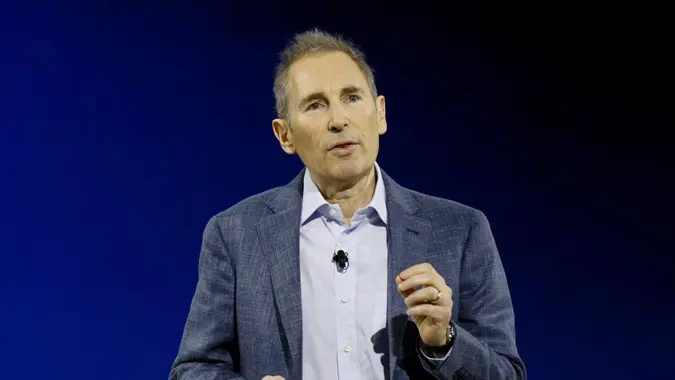This One-Word Question Makes the ‘Biggest Difference’ in Your Career, Says Millionaire Amazon CEO

Commitment to Our Readers
GOBankingRates' editorial team is committed to bringing you unbiased reviews and information. We use data-driven methodologies to evaluate financial products and services - our reviews and ratings are not influenced by advertisers. You can read more about our editorial guidelines and our products and services review methodology.

20 Years
Helping You Live Richer

Reviewed
by Experts

Trusted by
Millions of Readers
Amazon CEO Andy Jassy has been helming the world’s largest online retailer for a little over four years, and before that, served as SVP and CEO of Amazon Web Services for nearly two decades. It’s safe to say that Jassy could be considered a reliable source of advice on the topic of leadership and business acumen.
That’s precisely why it may be worth examining his philosophy as stated in an April letter to shareholders, in which Jassy zeroed in on one of the foundational reasons for his success.
The Importance of ‘Why’
At the core of Jassy’s argument: the importance of the question “why” and how being inquisitive as to the nature of how things unfold is a key factor in being able to intuit the most appropriate next steps — as well as to understand the elemental and intrinsic factors creating the framework you work, and produce, within.
“That’s because Amazon is a Why company. We ask why, and why not, constantly. It helps us deconstruct problems, get to root causes, understand blockers and unlock doors that might have previously seemed impenetrable,” Jassy said.
“Amazon has an unusually high quotient of this WhyQ (let’s call it ‘YQ’), and it frames the way we think about everything that we do,” Jassy added.
Amazon Was Built From a Foundation of Answers to ‘Why’ Questions
Jassy pivoted to outline the bedrock from which Amazon was formed: all on the back of questions as to why or why not.
From “Why can’t we offer customers every in-print book?” way back in 1995 to “Why not [sell] practically everything?” and “Why not let customers choose the selection, price and delivery speed they prefer from among [our] millions of sellers?”
In 2025, it’s clear that the Amazon CEO was illustrating a vision of what success looked like for those who were listening with a keen ear.
Jassy then turned to discuss the cornerstones of his approach to enacting a “Why culture,” breaking it down into a few key categories — taking the time to underscore three in particular:
Creating Leadership Principles That Set the Tone
Leaders listen, and by doing so, end up with a more diverse set of potentialities in mind.
This ensures that they make the right decisions more often than not, by taking the time to truly learn and understand what they are hearing. A backbone is necessary to politely reject unsound ideas, as well.
Creating Norms That Support the Why
Collaboration, presenting full narratives instead of bullet-point PowerPoint presentations and crafting a complete “working backwards” document array — FAQs and press releases in advance of specific coding — means that the “why” is always present, even during messy meetings with creative notions being thrown about before the task is set to in earnest.
Operating Like a Startup
In a lengthy breakdown, Jassy talked about the necessity of retaining the hunger of a startup operation. Real customer problems need to be tackled, improving the customer experience has to be central, builders and inventors are, of course, cherished — and team members must think like owners of the operation, not mere employees.
The “why” retains a central place in the minds of scrappy and quick-thinking team members who feel “fully accountable for solving the Whys of their customer experiences.”
Keys to Growth and Success
The Amazon CEO laid out his position, earned after a lifetime of experience, on the growth patterns common to successful individuals and companies.
“In the nearly 28 years I’ve been at Amazon, the biggest difference in the relative growth of companies and individuals has been their aptitude to learn. At a certain point, some leaders seem to lose their thirst to learn. It’s hard to know the reason in each case, but it’s as if some people find it too exhausting, too time-consuming or too threatening to not have all the answers,” Jassy began.
He explained that to stop learning would be to “risk undermining what we’re capable of building in the future. People with high YQ are always curious how they can get better, become wiser and incorporate their new knowledge into better customer experiences.”
You don’t have to run a business — let alone one as dominant as Amazon — for “why” to help you find success. If you find yourself struggling to build wealth, or even just gain your financial footing, starting with “why” and “why not” might lead you to answers that put you on the right path.
More From GOBankingRates
Sources
- Amazon, “CEO Andy Jassy’s 2024 Letter to Shareholders.”
 Written by
Written by  Edited by
Edited by 

























